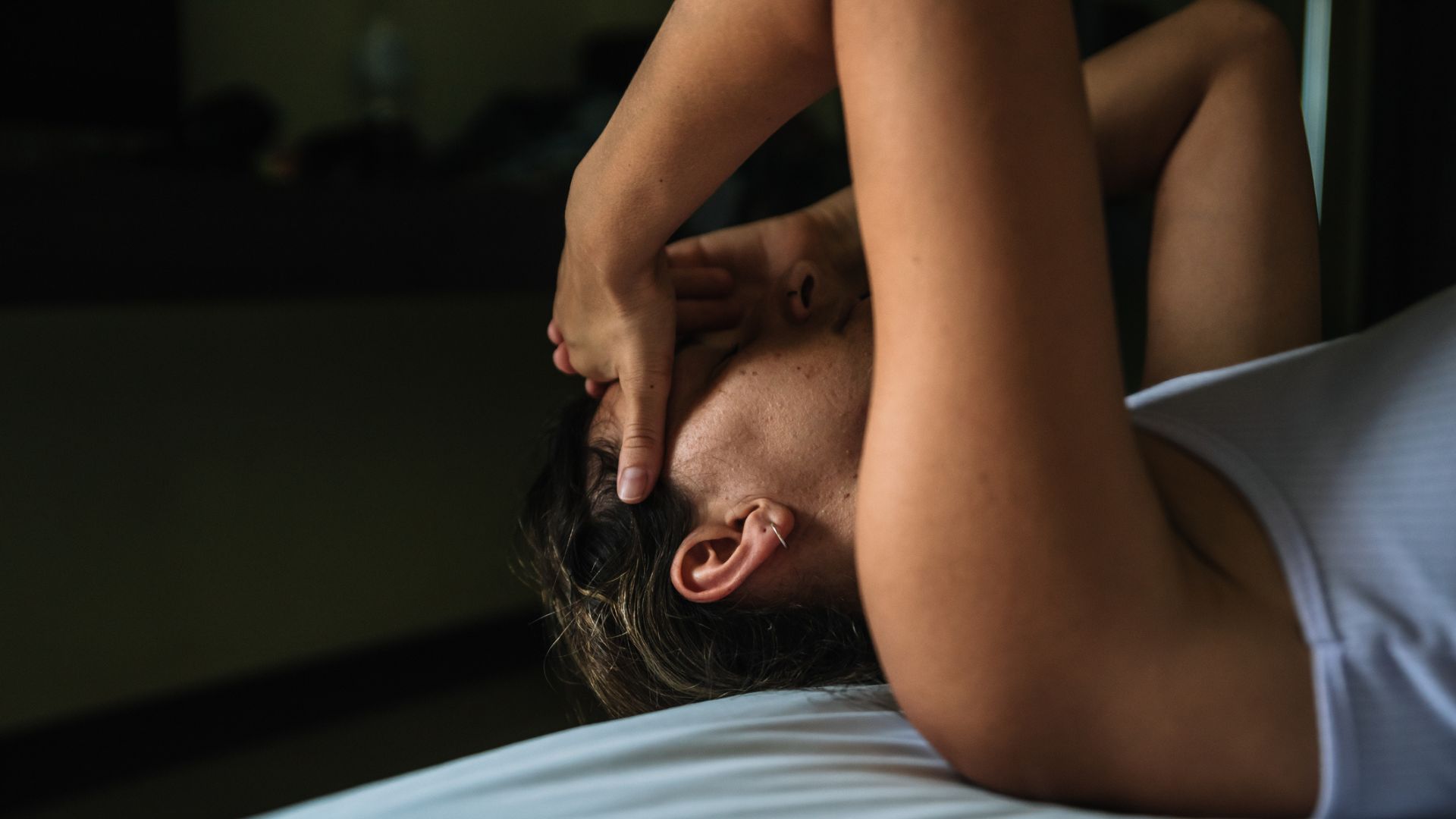What causes a UTI? The most common triggers - and why menopausal women are more likely to get one
What causes a UTI? Women are 30 times more likely to get one and UTIs are most common in menopause. Here, doctors explain why - and the causes to look out for


What causes a UTI? Even though women are 30 times more likely to develop a UTI than men, a number that rises in menopause, we don't talk about them nearly enough.
Whether due to social stigma or the presumption that we'll 'just know' how to deal with it, urinary tract infections (UTIs) are often dismissed in the conversation about women's health and wellbeing in perimenopause and postmenopause.
"UTIs can also mimic other conditions like bladder stones or sexually transmitted infections. If left untreated, a UTI can spread to the kidneys and cause more severe health issues, such as kidney infections or even sepsis, which is a life-threatening condition," says Dr Elise Dallas, a women’s health specialist.
That is to say, they are a serious health condition that can have long-term implications. Here, woman&home speaks to doctors to reveal what causes a UTI most often, why they tend to be more common at certain points in life, and what you can do to avoid one before it happens.
What causes a UTI?
1. Travelling bacteria
A UTI occurs when bacteria that shouldn't be there starts to grow inside the bladder, entering via the urethra - the sphincter at the lower end of the bladder, says Dr Deborah Lee, a sexual and reproductive health specialist who works with Dr Fox Online Pharmacy.
"The bladder opening in women – the urethra - is perilously close to the anus, hence it is easy for bacteria to find their way to the urethra and pass up inside the bladder. The bacteria grows on the bladder wall, causing inflammation of the bladder wall (also known as cystitis)," she says. "This leads to well-known UTI symptoms, such as abdominal pain, urinary frequency, blood in the urine, and pain when passing urine."
To prevent this from happening, wipe from front to back when using the loo, use the loo immediately and shower after having sex, says Dr Lee.
Sign up to our free daily email for the latest royal and entertainment news, interesting opinion, expert advice on styling and beauty trends, and no-nonsense guides to the health and wellness questions you want answered.
Dr Deborah Lee is a sexual and reproductive health specialist, working with all areas of gynaecological health. She also set up and ran her own menopause clinic. Dr Lee completed her medical degree at University of Southampton Medical School, trained as a GP and after a number of years specialised in Sexual & Reproductive Health (S&RH).
2. A weakened immune system
Conditions like diabetes, arthritis, flu, and chronic stress (otherwise known as burnout) can weaken the immune system and leave you more susceptible to UTIs. "This is because the body is less able to fight off infections, making it easier for bacteria to multiply and cause an infection," says Dr Dallas, who works with The London General Practice.
"Additionally, if the bladder does not completely empty, residual urine can become a breeding ground for bacteria, further increasing the risk of UTIs," she says. "These causes often interact, increasing the risk and severity of UTIs."
Dr Elise Dallas is a General Practitioner at The London General Practice with over 20 years of experience. She is a Member of the Royal College of General Practitioners and holds several postgraduate diplomas in Obstetrics and Gynaecology, Sexual and Reproductive Health as well as a qualification from the British Menopause Society.
3. Perfumed products
Perfumed products - such as baby wipes, vaginal douches, perfumed soaps, and bubble baths - can irritate the urethra and potentially lead to a UTI.
"The vagina is self-cleaning, so it will clean itself," says Dr Lee. "All these products contain colourants, foaming agents, thickeners, preservatives, fragrances, and more, and they can cause extreme irritation to the delicate skin of the vaginal walls and the urethra."
4. Poor gut health
Gut health has been the health buzzword for the last few years now - and for good reason. Research shows that the bacteria in our gut has a direct link to our mental and physical health - and that includes the risk of developing a UTI.
A new study, linked to George Emil Palade University of Medicine, found that within a group of women with a history of recurrent UTIs, more than 70% of participants had an imbalance of gut microbiome.
To ensure that poor gut health isn't the cause of a UTI in the future, Dr Lee recommends adding plenty of probiotics to your diet. "These are healthy bacteria needed to keep the vagina and bladder functioning optimally. Some of the best gut-healthy foods include live yoghurt, kefir, sourdough bread, pickled vegetables, and cottage cheese."

Pickled vegetables and other gut-friendly foods can help to improve your gut health and lessen the risk of UTIs.
5. Tight pelvic floor muscles
The pelvic floor is the hammock of muscles that extend from the tailbone to the pubic bone. While we often talk about doing kegel exercises to strengthen the pelvic floor and why it's important to do so, we don't often think about the other side of the coin: the effects of a pelvic floor that's too tight.
One such effect is a UTI, says Jane Clarke, a continence nurse working with The Confidence Club. "Tight pelvic floor muscles can interfere with the flow of urine, causing it to be weak. This can prevent it from effectively flushing out bacteria and lead to UTIs," she says.
6. Genetics
While certain genetics don't promise to cause a UTI, some women are just more prone to getting a UTI due to certain genetic factors. "Those with a family history of recurrent UTIs as well as conditions like urinary incontinence, difficulty fully emptying the bladder, and pelvic organ prolapse in midlife increase the risk [of developing a UTI]," says Dr Dallas.
7. Menopause
Menopause, much like genetics, isn't a direct cause of UTIs but those who go through menopause are more likely to develop one thanks to the natural drop in hormone levels.
"Urinary symptoms are a common feature of genitourinary syndrome of menopause (GSM)," says Dr Lee. "This condition is an umbrella term for the common urogenital symptoms a woman suffers in perimenopause. They include vaginal dryness, painful sex and urinary symptoms, including recurrent UTIs."
Why you're more likely to get a UTI in menopause
During perimenopause, oestrogen levels drop by 90%. "The pelvic floor, vagina and bladder are rich in oestrogen receptors and when this hormone is lacking, it can lead to shrinkage of the vaginal skin. The urethral opening becomes less competent and hence more likely to allow bacteria into the bladder," explains Dr Lee.
Another important development that can cause a UTI in menopause is a change in the bacteria makeup of the bladder and urinary tract. "This is known to differ between pre-, peri, and post-menopausal women," the doctor says. "Premenopausal women have large numbers of lactobacilli in the vagina and the bladder which produce lactic, which keeps the pH acidic. This helps prevent other bacteria from growing. However, in perimenopause and beyond, the numbers of lactobacilli fall, and less lactic acid is produced, so the pH rises and becomes more alkaline. This is when UTIs, as well as bacterial vaginosis (BV), can set in."
How can I prevent a UTI during menopause?
- Topical treatments: The National Institute for Health and Care Excellence (NICE) endorses the use of topical oestrogen – a cream (Ovestin) or a pessary (Vagifem) – which is directly applied to the vagina and genital area, says Dr Sharer. "The improvement can take a few weeks to become obvious, so you need to persist, but you may need to use the topical treatment long-term."
- Make sure you stay hydrated: When you are dehydrated, you go to the loo less, which gives the bacteria a chance to multiply. Water is best, while caffeine, fizzy drinks, and alcohol are best avoided.
- Keep the genital area clean: While I'd hope most of us shower every day, keeping this area means wiping from front to back, using the loo straight away after sex, and showering after sex.
- Wear natural cotton underwear: There's no proof that synthetic underwear directly causes UTIs but the experts recommend keeping this area breathable anyway, to help prevent bacteria from growing. "Avoid tight jeans and sitting for long periods where you get hot and sweaty down below," says Dr Lee.
- Talk to your gynaecologist: If you're worried about recurrent UTIs in menopause, speak to your doctor. They may be able to prescribe D-mannose for you. "This is a special type of sugar molecule that sticks to the bladder wall and helps prevent bacteria from adhering to the bladder wall cells. Some studies suggest this may be as effective as antibiotics," she says.
Does a UTI go away on its own?
In many cases, a UTI will go away on its own. "In around 20% of cases, a UTI will resolve itself with no treatment other than increasing the amount of fluids," says Dr Sharer. "Although, there is no evidence for the effectiveness of cranberry juice despite the commonly-held belief. It's certainly important to drink plenty of fluids to flush the bacteria, cell debris, blood, and white cells out of the bladder though."
Some old wives' tales do stand true for the treatment of a UTI, however. "Dissolve one to two teaspoons of baking soda in a glass of water and drink it all right away," advises Dr Lee. "This makes the urine more alkaline, and it will hurt to pee less."
However, there are some cases where you will need to go and see a doctor about a UTI.
When to go to the doctor about a UTI
If you're having recurrent UTIs, see your GP as you need tests to check for any underlying causes, says Dr Lee. Also, if your symptoms haven't cleared up on their own after a few days, you'll need to see your doctor for antibiotics.
Equally, if you think your UTI could be down to menopause symptoms, it's worth visiting your doctor to discuss treatment options for this, such as hormone replacement therapy (HRT). "Urinary symptoms are commonly a feature of genitourinary syndrome of menopause (GSM). This condition is an umbrella term for the common urogenital symptoms a woman suffers are perimenopause. They include vaginal dryness, painful sex and urinary symptoms including recurrent UTIs," says Dr Lee.

Grace Walsh is woman&home's Health Channel Editor, working across the areas of fitness, nutrition, sleep, mental health, relationships, and sex. She is also a qualified fitness instructor. In 2025, she will be taking on her third marathon in Brighton, completing her first ultra marathon, and qualifying as a certified personal trainer and nutrition coach.
A digital journalist with over seven years experience as a writer and editor for UK publications, Grace has covered (almost) everything in the world of health and wellbeing with bylines in Cosmopolitan, Red, The i Paper, GoodtoKnow, and more.